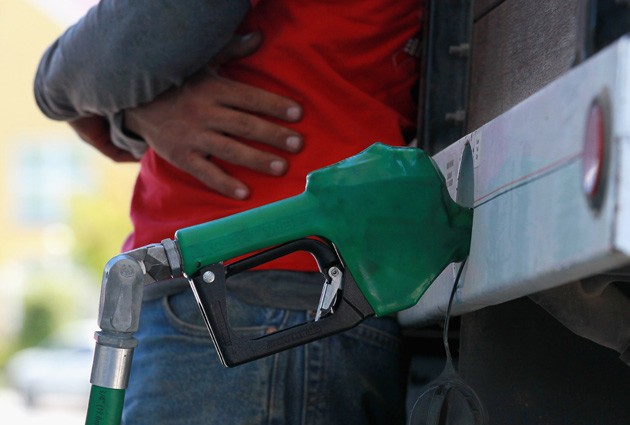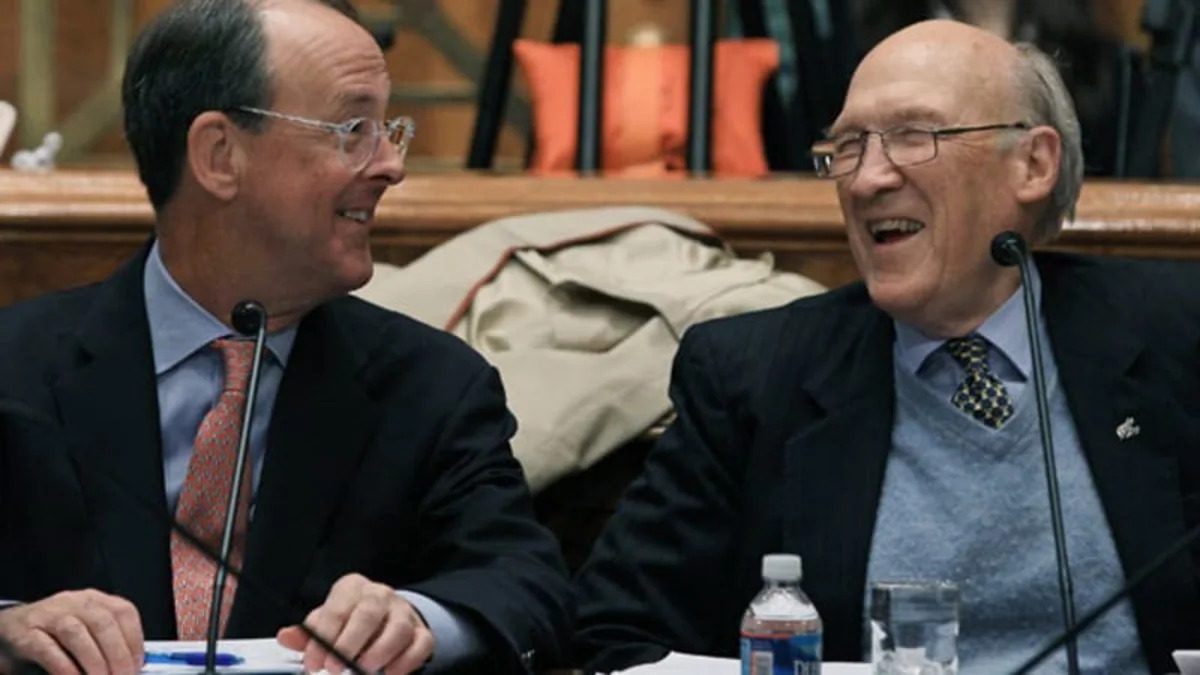Senator Alan Simpson (left) and Erskine Bowles (right), Co-Chairman of the Deficit Reduction Commission
There is a sport in Washington D.C. that comes around like deer season every year: the gas tax debate. And stepping into the clearing this week with brown overcoats and deer antler hats are some former legislators and government officials – none of whom have to run for office – who are recommending a 15-cent additional federal gas tax starting in 2013 to help trim the federal budget deficit.
This measure has about as much chance of getting through the new Congress as a proclamation that would make Earth Day a national bank holiday. Still, given the fact that the Feds have laid a claim to my nine-year old son's unborn children's piggybanks, it's worth a few minutes to air out the subject.
The co-chairman of the bipartisan deficit reduction commission, former Clinton Administration official Erskine Bowles and former Republican Senator Alan Simpson, have called for a sweeping set of reforms in the way of taxes, spending cuts and elimination of a myriad of tax credits and deductions to which we have grown accustomed – mortgage interest for one.
The 15-cent per gallon hike in Federal gas taxes is paltry by European standards, but would be used specifically for transportation infrastructure improvement: roads, bridges, etc.
Continue reading...
Gas taxes are the single most unpopular tax an elected official can foist upon a voter according to elected officials. A couple of years ago, I had lunch with Rep. John Dingell (D-MI) who has held the Southeast Michigan seat since Eisenhower was President. Seriously. He agreed that it was a smart and sound policy, but one that "kills you with the voters." Of course, that discussion was about a headline-grabbing, heart-clutching $1.00-a gallon hike in the tax. The commission is only talking about a 15-cent additional tax. In today's pump reality, that means gas would go from about $3.00 a gallon in Michigan where I live to $3.15.

If you figure ten gallons of gas a week, or even 20, is purchased by most Americans who drive their cars regularly, that comes to $1.50 to $3.00 a week. I know this subject inflames passions, but I'm hard pressed to find a person with enough money to be actually driving a vehicle in the first place who also can't absorb an additional $1.50 to $3.00 a week.
But that's not the point, you say? The point is that tax-and-spend liberals will spend and spend and spend while they keep heaping new taxes on our backs. That's probably true, though, both parties are guilty of hiking taxes over time without addressing spending. Seriously.
The point, though, is that a gas tax is – *gulp• – a good tax. If, as the commission suggests, the gas tax hike is targeted for infrastructure improvement, that's a lot of improved roads and bridges, and a lot of jobs. As someone who recently had a flat tire and bent wheel from a Rt. 80 pothole, and a $500.00 bill to go with it, I think this is a good idea.
While I'm not keen to embrace Europe's $7.00-per gallon-plus system, it's hard to argue against the facts that European roads put their U.S. counterparts to shame. And the European Union is not overburdened with gas guzzler SUVs driven by sole drivers they way we are in the U.S. On the contrary, in Europe, a Ford Focus is a family car. That idea may not play well in rural Georgia, but I'm confronted by the reality that I don't see European families out demonstrating against having to buy Focuses and Toyota Corollas for families of four.
You know who else has been for higher gas taxes? George Bush and Dick Cheney.
You know who else has apparently been for higher gas taxes? Ford CEO Alan Mulally and Ford chairman Bill Ford, former General Motors CEO Rick Wagoner, former Chrysler CEO Tom Lasorda. And, hold on to your hats... George W. Bush and Dick Cheney.
According to two sources who were in the room in a March 2007 meeting with Detroit CEOs, Bush and Cheney both agreed that while higher gas taxes were a good idea for both deficit reduction and driving the sale of high fuel economy vehicles, they ultimately dismissed such moves for political, not rational, reasons. And neither would admit to supporting it in public.
Lee Iacocca may have said it best when he said the reason Americans are so violently opposed to higher gas taxes is that after the publicity around it is used by one political side or the other, the voter is reminded of the tax two or three times a week when they gas up and watch the dial spin higher and higher.
To be fair, Bowles and Simpson aren't completely without allies on the Hill. Tom Carper of Delaware, a Democrat, and George Voinovich of Ohio, a Republican, wrote to President Obama's commission on reducing the federal debt, proposing the measure. They suggest that 10 cents of the increase go toward paying down the debt, and the rest toward transportation infrastructure. Of the two, only Carper is running for re-election. Voinovich, a Republican from Ohio (where my tire blew on the pothole) is retiring.
10 cents of the increase would go towards deficit reduction, the remaining 5 cents toward infrastructure.
The overall deficit reduction plan looks smart, but completely unfeasible, politically, in its entirety. To simplify and to lower individual and corporate tax rates, the co-chairmen's plan eliminates or scales back $1.1 trillion in tax breaks, ranging from the popular deduction on mortgage interest to charitable givings, both of which would be replaced with 12 percent nonrefundable tax credits available to all taxpayers. The changes, the co-chairmen claim, would allow the corporate tax rate to drop from 35 percent to 26 percent and for the six existing individual tax brackets (currently ranging from 10 percent to 35 percent) to be boiled down to three: 8 percent, 14 percent and 23 percent.
Those numbers look, on the surface, compelling, and as if they would attract anti-tax Republicans to the bargaining table. But don't count on it. For every member of Congress who would vote for a bill containing a gas tax, there is an opponent in the next election who will make an ad superimposing their face on a gas pump dial spinning out of control.
David Kiley, the author of this post, is an award winning journalist, covers the auto industry from Ann Arbor, MI. He has followed the industry for 25 years, and held posts including Detroit Bureau Chief for USA Today and senior correspondent for BusinessWeek. He is also the author of two books on the industry: Getting The Bugs Out: The Rise, Fall and Comeback of Volkswagen in America [John Wiley and Sons 2001], and Driven: Inside BMW, The Most Admired Car Company in the World [Wiley, 2004].
[Images: Mark Wilson and Justin Sullivan/Getty]


Sign in to post
Please sign in to leave a comment.
Continue